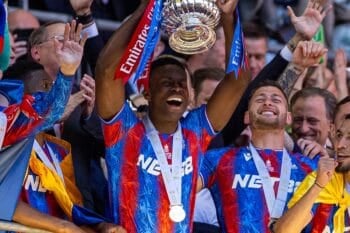Shankly: My Story
Bill Shankly with John Roberts (2010)
The Autobiography: 50th Anniversary Edition
Trinity Mirror Sport and Media
Reading, reviewing and writing about any book about Bill Shankly for a Liverpool FC website is never going to be an easy task. You want to be objective in your review but you feel that if there are any criticisms to be made about this book, some people will feel that you are criticising the man, and subsequently disrespecting Liverpool Football Club’s proud history. This particular book is made up of Shankly’s own words, which makes any criticism seem even more personal in nature. I also wondered whether any complaints about Shankly’s autobiography would mean that I was at risk of being thrown out of the red half of Merseyside without as much as a goodbye!
I should not have worried. I enjoyed reading this autobiography because I felt as if I was listening to the words from the ‘horse’s mouth’, which took Liverpool Football Club from a miserable footballing backwater to a colossus in national and international football. This autobiography was originally released in 1976 and there have been no alterations to the original text. You are essentially reading the words that were written in the complicated two-year aftermath of Shankly’s shock exit from the Anfield dug out.
Much has been written and said about Shankly down the years, and not many managers are still immortalised in their ground nearly thirty years after their death. The chapters in this book are a mixture of proud reminiscence, tributes to colleagues as well as a demonstration of expert football knowledge. I also detected a real tinge of sadness that Shankly was not barking orders from the touchline, and this regret is especially evident in the latter chapters of this raw account of a key figure in the game that really had a story to tell.
If you pick up this autobiography, the inside cover will tell you that “someone at Anfield decided Shankly’s book was too red hot to handle.” Being unaware of the 1976 edition, I was a bit unnerved about what I was going to read. Was Shankly going to reveal an unknown hatred about Liverpool Football Club whether on or off the pitch? After all, this book was banned from the club shop on publication. After reading the last word, it is not hard to understand why this book did not immediately appear on the shop shelves but do not dismiss this autobiography as a chance for Shankly to wash a load of dirty laundry to his adoring public.
This book constitutes an autobiography of a man who was struggling to move on from an outfit that consumed his life for so long. We ourselves may have not been managers of the top football teams in the UK, or any football team unless we include ‘fantasy’ sides and a spell on Championship Management, but surely we have all struggled to move on from a person, business or event that has meant so much to us. Although with the benefit of hindsight, we can understand why the club wanted to give some space to Bob Paisley to be his own man in the dugout. However, I had some sympathy for Shankly. He loved his football, and this book does paint a portrait of a man who was bemused about how his football career finished in such a sudden fashion.
The early chapters of this book give an interesting and comprehensive insight about Bill Shankly Scottish childhood which climax in his big break at Carlisle United followed by a successful spell at Preston during the Tom Finney years. North End was dominating British football during the thirties and the account includes references to Preston’s appearances in the 1937 and 1938 FA Cup Finals. We are also given an impression of Shankly’s immense pride at representing Scotland on the international football stage. We also learn a little bit about wartime football in the United Kingdom including the fact that players could play for any team near to where they were billeted to help the war effort.
Shankly’s early managerial career took him across the north of England to Carlisle, Grimsby, Workington and Huddersfield. Throughout these chapters, Shankly constantly pays tribute to the colleagues that helped him to establish his managerial credentials. He also records the various deals for players that he managed to instigate. Denis Law is noted to be a particular prized catch and to a certain extent, these particular chapters become a ‘Who’s Who’ of British football in the fifties.
The chapters about Shankly’s time at Liverpool understandably form the bulk of this autobiography. From the moment that Shankly “had no doubts about going to Liverpool, no misgivings,” the ex-Liverpool manager talks with justifiable pride about his players, the victories and the cups that came to Anfield during his fifteen years. It is up to you if you believe that this was Shankly merely celebrating his achievements like every other retired manager ,or whether he wanted to subtly tell the club’s hierarchy that he wanted to maintain some involvement in the club after he had finished his time in the Anfield dugout.
We will never know whether there were many subtexts in this autobiography. Shankly died in September 1981 and many of us just want to celebrate Bill Shankly and his achievements in the game. This autobiography allows us to do just that. The contemporary nature of the book makes the words seem more vivid than if this book was being written in 2010.You could play an intensive psychological guessing game about what was said to whom in the summer of 1974 and the subsequent years after Shankly made his shock resignation. This autobiography could allow you to do that too although I would argue that life is a little bit too short to speculate on the motives and mood of Bill Shankly in 1976.
This book is a celebration of Shankly’s life including his contribution to Liverpool Football Club. I prefer to celebrate a man that brought Liverpool back into the main stream of British football the fact that Liverpool Football Club seemed to move on from one era to another without a painful ‘transition’ in the context of ‘on the pitch activities’. This book has helped me to do that. I would add that other clubs such as Manchester United, when they start to seriously contemplate the post-Ferguson era, would surely wish for a similar smooth changing of the guard.



















Fan Comments